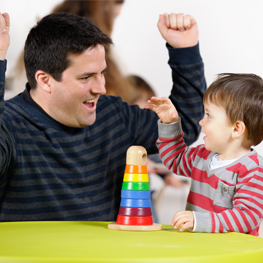
As toddlers develop, the way they understand and show their feelings change as well. Toddlers have strong emotions. With your help, your toddler can learn to better understand and talk about these emotions.
Young toddlers (12 to 18 months old):
can feel anxious and frustrated
have little self-control over their feelings or impulses (e.g. biting and hitting)
begin to recognize that they have their own feelings
don’t yet have the words to express how they feel, so they often show their emotions with their body
can be afraid of strange people, objects, animals or events
can also become anxious when separated from their parents
begin to recognize that other people have emotions too
don’t yet understand other people’s feelings or views
You can help your young toddler understand and cope with feelings:
Describe and show empathy.
Give her a name for her feelings so that she learns the words.
Help her to know that you understand and will help her (e.g. use a kind voice to say, “I see you are mad. You really wanted that toy.”).
Distract. Use another interesting toy, game or song to distract her.
Redirect. Change the activity or move it to a more suitable place.
Older toddlers (18 months to 3 years old):
feel emotions very strongly and express them with their bodies, whether they’re happy, mad or sad
can be overwhelmed by their feelings
can get upset when they’re asked to do something they don’t want to do
are easily frustrated when they can’t do what they’re trying to do
are starting to learn how emotions make them feel inside
need help learning how to talk about the way they feel
Your older toddler’s ability to think is developing. When you name your toddler’s emotions and show that you understand, you are building connections between the emotional and thinking parts of your child’s brain.
“Parents can help their children learn about feelings, and how to show them in healthy ways that don’t hurt themselves or others,”says Suzanne Blair, Program Coordinator with the AHS Early Childhood Team. “Parents can also help children learn to calm themselves down and to problem solve. These are the early building blocks for their lifelong positive mental health and problem solving skills.”
These skills are known as emotional regulation. This process will take many years to develop. Your child will need lots of help and practice.
Learning to regulate emotions
Older toddlers show their emotions with physical reactions because they don’t yet have the words to use. When they are excited they may jump, skip and laugh loudly. When they are upset they may yell, throw things, hit or bite. Many parents are surprised by how strong their toddler’s emotions are. Your toddler needs your help to learn other ways to show her frustration. It’s important to let your child know that you accept her feelings even if the behavior isn’t okay.
“Toddlers can often feel overwhelmed by their feelings and that is why they show their emotions in physical ways,”says Blair. “Parents can help their children to learn to express their feelings in positive ways by talking about feelings, teaching their child how to calm down and by modeling healthy coping skills.”
You can help your toddler begin to manage or regulate her emotions by providing warmth and structure.
Provide warmth:
Be patient - remember your child is just learning.
Accept your toddler’s feelings and let your toddler know you understand.
Don’t make fun of or laugh at her when she is upset or afraid.
Provide structure:
First, name the feeling and show your toddler that you understand. Limit behavior that could hurt your toddler or other people (e.g. “I see you’re angry. It’s okay to be angry. It’s not okay to bite.”).
Explain your reasons in words your toddler can understand (e.g. “Biting hurts people.”).
Give your toddler one or two ideas for what she can do instead (e.g. sit with you to calm down, make a mad face, take a deep breath, use words to tell how she is feeling, walk away, hug a stuffed toy).
As she gets older, ask her what she thinks she could do, rather than telling her what to do. With practice, she’ll be able to think of these ideas when she’s on her own.
The above information contains excerpts from Alberta Health Services’Healthy Parents, Healthy Children print and online resources.
The Healthy Parents, Healthy Children team is part of the larger Healthy Children and Families team at Alberta Health Services. Visit healthyparentshealthychildren.ca or visit your local community/public health centre for a print copy. Find them on Facebook at Healthy Parents, Healthy Children or follow them on Twitter @AHS_HPHC
Calgary’s Child Magazine © 2024 Calgary’s Child